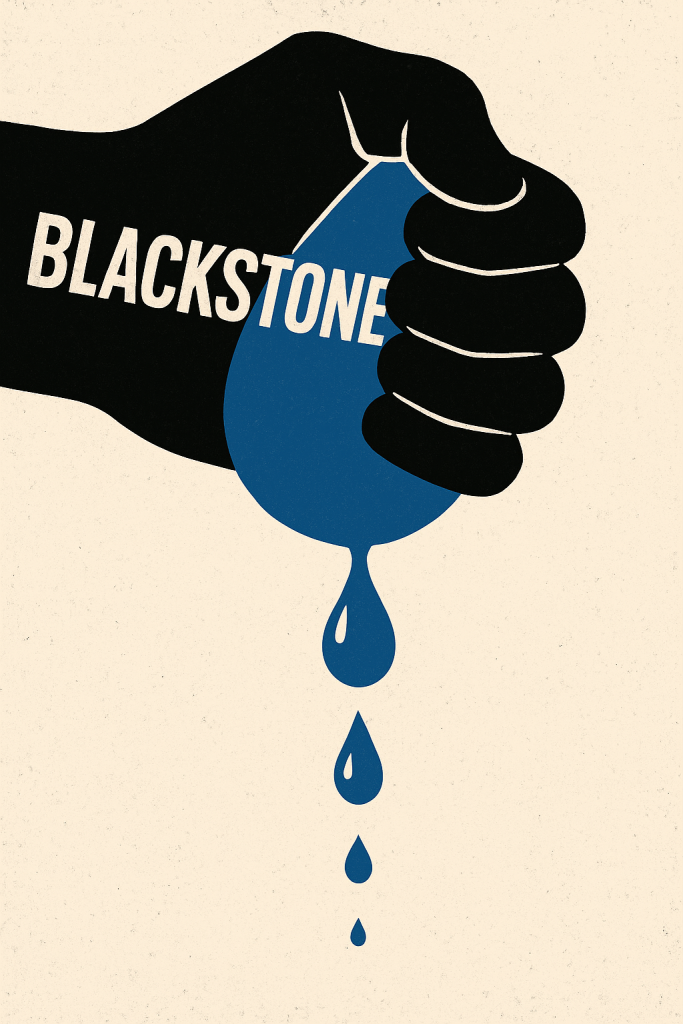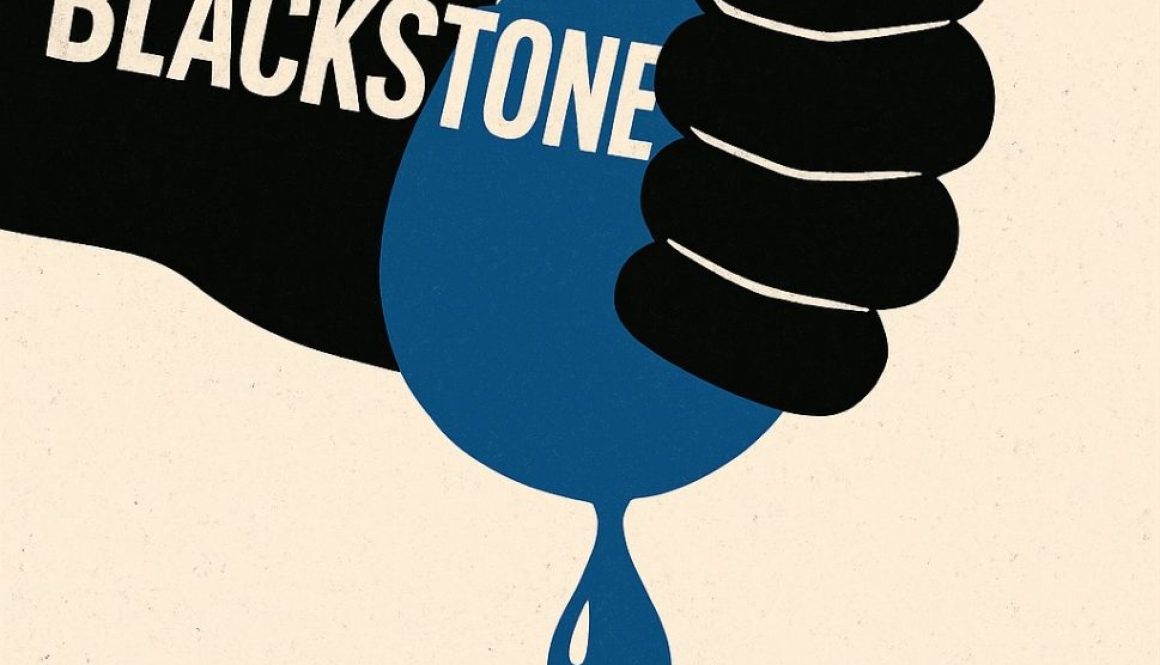Profit Above All Else: Bad For NM & Water
Why Private Equity Control of Our Utilities Is a Dangerous Gamble
In the last two decades, private equity has transformed from a niche investment strategy into a global powerhouse. With over $12 trillion in assets under management—more than the GDP of every country except the U.S. and China—private equity firms touch nearly every sector of American life.
Turning over essential services—electricity and gas—to private equity firms like Bernhard Capital Partners (BCP) and Blackstone respectively risks profit maximization at the expense of customers, workers, water and our environment.
Private equity firms raise money from large investors—often public pension funds for firefighters, teachers, and state employees—and use it to acquire companies. Once they take control, their priority is to boost returns for investors, not to build sustainable operations or protect communities. This can mean cutting staff, raising prices, or extracting value through complicated financial maneuvers. These tactics are not theoretical. They have repeatedly harmed workers, patients, tenants, and customers across the country.
When private equity enters an industry, the evidence shows higher costs, lower quality, and weakened oversight. In nursing homes, for example, private equity ownership is linked to worse patient outcomes and higher mortality. In housing, Blackstone and its affiliates have been accused of fueling the global housing crisis by hiking rents, imposing heavy fees, reducing maintenance and instigating evictions. In utilities, the danger is even greater because people cannot simply switch to another provider.
Bernhard Capital Partners’ Troubling Record
Bernhard Capital Partners has no experience running a regulated gas utility. It has racked up violations with the EPA and OSHA and with state regulatory agencies in New York, Massachusetts, and Louisiana. Its track record should cause alarm for our communities.
- Water treatment mismanagement. A BCP-operated company failed to properly operate and maintain a water treatment plant. “[A] large amount of sludge buildup was observed in the receiving stream,” according to regulators. “Bloodworms were also noted throughout the sludge within the receiving stream, which is indicative of stagnant water containing organic matter commonly associated with sanitary waste.” This is not a minor infraction—it reflects a breakdown in basic safeguards for public health and environmental protection.
- Hazardous waste mishandling. A BCP subsidiary was cited for mishandling asbestos and other hazardous waste: failing to comply with notification and identification requirements, providing inadequate training to personnel, improperly processing, packaging, or transporting dangerous materials, and failing to minimize exposure. Such violations put workers at serious risk of illness and contamination.
- Wage theft on public works projects. A BCP contractor was found to have shortchanged 84 employees on five public works projects by neglecting to pay full overtime and failing to report accurate payrolls. These violations resulted in a $222,141 penalty by the Massachusetts Attorney General. If a company cuts corners on workers’ pay in public projects, it raises questions about how it will treat utility workers and ratepayers under less scrutiny.
Blackstone’s Troubling Record
 Blackstone, the world’s largest private equity firm, has its own long list of controversies—several of which implicate fundamental rights and public trust.
Blackstone, the world’s largest private equity firm, has its own long list of controversies—several of which implicate fundamental rights and public trust.
- Privacy violations at Motel 6. In 2018 and 2019, Motel 6, owned by Blackstone, settled for $19.6 million after disclosing guest lists to U.S. Immigration and Customs Enforcement (ICE) without a warrant. This warrantless disclosure endangered immigrants and violated customer privacy rights.
- Genetic data concerns at Ancestry. In 2020, Blackstone acquired a majority stake in Ancestry.com, gaining access to millions of people’s genetic information. This acquisition triggered widespread concern about how a profit-driven private equity firm might use or monetize sensitive data. Blackstone has fought class-action litigation over misuse of data belonging to people who never consented to genetic testing but were linked through biological relations.
- Illegal child labor at Packers Sanitation Services. The U.S. Department of Labor found more than 100 children (ages 13-17) illegally working in dangerous conditions cleaning slaughterhouses for Packers Sanitation Services Inc., a Blackstone portfolio company. A teacher first raised the alarm after seeing a student with hydrochloric acid burns. The Labor Department fined the company $1.5 million for these violations.
These examples are not random. They show a pattern of disregard for basic human rights, public safety, regulatory standards, and legal obligations.
Gas and electric utilities are not like hotels, slaughterhouse contractors, or tech platforms. They are lifeline services, with long-term infrastructure that must be maintained for decades. The focus must be on reliability, safety, and environmental stewardship. When a private equity firm acquires a utility, the temptation to cut maintenance, self-deal, impose aggressive rate hikes is intense. Ratepayers and taxpayers ultimately bear the costs, whether through higher bills or environmental cleanup after failures.
One of the most dangerous and least visible risks of private equity ownership of public utilities is the explosion of “affiliate transactions.” Under this model, the parent company steers lucrative “procurement opportunities”— construction, consulting, management, IT, and even financing—to other firms it also owns. On paper these deals may look like ordinary vendor contracts, but in practice they are legal self-dealing schemes that drain millions of dollars from ratepayers into private equity pockets. Because these transactions are often buried under layers of subsidiaries and shell companies, the Public Regulation Commission (PRC) faces an almost impossible task in tracking and evaluating their fairness. The procurement maze makes it easy for private equity owners to charge inflated fees, extract hidden profits, and shift risk back to the utility while reducing transparency and accountability. In short, the very structure of private equity ownership creates incentives to overcharge and under-deliver, all while shielding critical information from the public and regulators.
Additionally, because the owners of both BCP and Blackstone don’t live here, there is little incentive for them to conserve water, protect our environment, or build climate resilient communities. Yet our utilities face these challenges—aging infrastructure, the need for decarbonization, and increasing risks from extreme weather. Handing control to firms whose DNA is spending capital to supercharge profits, not create community benefit, is reckless.
Our state regulators and elected officials have a duty to protect the public interest, not private equity profits. Approving the sale of our gas utility to BCP and our electric utility to Blackstone would hand over critical public services to two firms with documented histories of cutting corners, violating laws, and putting vulnerable populations at risk.
Instead of repeating the mistakes seen elsewhere we should demand transparency, robust oversight, and public ownership models that prioritize affordability, accountability, and sustainability.
Write to the PRC, sign petitions, call/write your legislators. Activism is the antidote to despair.


